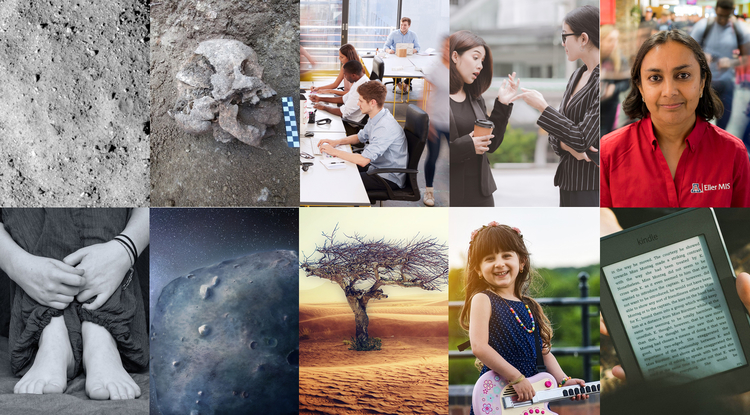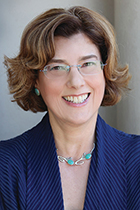Does an asteroid hold clues to the origins of the solar system? How does office layout impact a person's health? Can music strengthen familial bonds? UA researchers explored these questions and much more in 2018. The UA Communications team assesses the 10 most impactful stories of the year.
EXTRA INFO: Another 10
And 10 more stories from the UANews honorable mention list for 2018:
- “Ceres Takes Life an Ice Volcano at a Time”
- “UA Scientists Gear Up to 'Touch the Sun'”
- “What Makes A Good Working Dog? Canine 'Aptitude Test' Might Offer Clues”
- “Dating the Ancient Minoan Eruption of Thera Using Tree Rings”
- “A World without Brick-and-Mortar Stores? Even Avid Online Shoppers Say, 'No, Thanks'”
- “Proposal to Make Standardized Test Optional for Law Schools Moves Forward”
- “Antarctic Melting Slows Atmospheric Warming and Speeds Sea Level Rise”
- “Good and Bad News about Exercise Posts on Social Media”
- “Naps Hinder Learning in Children With Down Syndrome”
- “Study: Small Talk Not as Bad as Previously Thought”
In addition, Inside Tucson Business ranked its "Top 10 Science Stories of the Year" also, listing a “Lung on a Leaf” research story involving the UA Pulmonary division’s Ken Knox, MD, and Louise Hecker, PhD, as well as stories on treating Parkinson’s patients with ketamine and printing bones using 3D printers and adult stem cells among their choices.
 From exploring the farthest edges of our solar system to uncovering the "vampire burial" methods used in the distant past, research led by the University of Arizona generated headlines throughout the world in 2018.
From exploring the farthest edges of our solar system to uncovering the "vampire burial" methods used in the distant past, research led by the University of Arizona generated headlines throughout the world in 2018.
Here are the 10 most impactful UA-related stories this year, according to the UA Communications team:
■ 1: OSIRIS-REx Arrives at Asteroid Bennu, Dec. 4
Since its launch on Sept. 8, 2016, OSIRIS-REx has spent two years catching up with asteroid Bennu on its orbit around the sun. The spacecraft's arrival at Bennu on Dec. 3 marks a major milestone, with the mission transitioning from flying toward the asteroid to orbiting around it. (New York Times, Washington Post, BBC, Associated Press, WIRED)
■ 2: 'Vampire Burial' Reveals Efforts to Prevent Child's Return from Grave, Oct. 11
Archaeologists found the remains of a 10-year-old child with a stone inserted into his or her mouth at a fifth-century Italian cemetery. They think the stone was meant to keep the child from rising from the dead and spreading malaria to the living. (USA Today, Washington Post, Sky News, Newsweek, Forbes)
 ■ 3: Your Office May Be Affecting Your Health, Aug. 20
■ 3: Your Office May Be Affecting Your Health, Aug. 20
Workers in open office seating had less daytime stress and greater daytime activity levels compared to workers in private offices and cubicles, according to new research led by the UA. That greater physical activity at the office was related to lower physiological stress during after-work hours outside the office, researchers said. This is the first known study to investigate the effects of office workstation type on these objective measures.
“This research highlights how office design, driven by office workstation type, could be an important health-promoting factor” or not, said Esther Sternberg, MD, research director of the UA Center for Integrative Medicine and senior author on the study. (BBC, ABC News, Vogue)
■ 4: Incivility at Work: Is 'Queen Bee Syndrome' Getting Worse?, Feb. 19
The phenomenon of women discriminating against other women in the workplace – particularly as they rise in seniority – has long been documented as the "queen bee syndrome." As women have increased their ranks in the workplace, most will admit to experiencing rude behavior and incivility.
"Studies show women report more incivility experiences overall than men, but we wanted to find out who was targeting women with rude remarks," said Allison Gabriel, assistant professor of management and organizations in the University of Arizona Eller College of Management. (Wall Street Journal, NBC's "Today", Entrepreneur)
■ 5: Researcher Looks at 'Digital Traces' to Help Students, March 7
Sudha Ram, a professor of management information systems, directs the UA's INSITE: Center for Business Intelligence and Analytics in the Eller College of Management. The center focuses on harnessing the power of big data, using machine learning and network science to help businesses and organizations make better-informed decisions.
The goal of Ram's Smart Campus research is to help educational institutions repurpose the data already being captured from student ID cards to identify those most at risk for not returning after their first year of college. (USA Today, Newsweek, Fox News)
■ 6: Study Reveals Which Transgender Teens Have Highest Suicide Risk, Sept. 10
Research has shown that transgender adolescents are at greater risk for attempting suicide than cisgender teens, who identify with the gender they were assigned at birth. A new study from the UA takes a deeper look at who within the transgender adolescent community is most at risk.
UA researcher and lead study author Russell Toomey and his colleagues found that transmasculine adolescents – those who were born female but identify as male – and teens who don't identify as exclusively male or female are at the greatest risk for attempting suicide. (CNN, Reuters, BuzzFeed)
■ 7: Rare Blue Asteroid Reveals Itself During Fly-By, Oct. 24
Blue asteroids are rare, and blue comets are almost unheard of. An international team led by Teddy Kareta, a doctoral student at the UA Lunar and Planetary Laboratory, investigated (3200) Phaethon, a bizarre asteroid that sometimes behaves like a comet, and found it even more enigmatic than previously thought. (USA Today, CNET, Newsweek)
■ 8: Six from UA Contribute to National Climate Change Report, Nov. 23
Six UA researchers helped produce a new assessment, released Nov. 23 by the U.S. Global Change Research Program, that informs U.S. citizens, communities and businesses on the impacts of climate change across the country.
The report, Impacts, Risks and Adaptation in the United States, is the second volume of the fourth National Climate Assessment, which represents the most recent comprehensive national effort to analyze the impacts of climate variability and change on sectors and regions of the United States. Written by more than 300 authors, the report assesses a range of potential impacts to help decision makers and the public better identify both risks that could be avoided or reduced and benefits that could be realized. (New York Times, Bloomberg, Fortune)
■ 9: To Improve Relationship With Kids, Try Turning Up the Music, May 2
Researchers found that young men and women who shared musical experiences with their parents during childhood – and especially during adolescence – report having better relationships with their moms and dads as they enter young adulthood.
"If you have little kids and you play music with them, that helps you be closer to them, and later in life will make you closer to them," said study co-author Jake Harwood, professor and head of the UA Department of Communication. (Huffington Post, XXL, Popsugar)
■ 10: Why Your E-Book Might Not Feel Like 'Yours', May 23
Despite stereotypes that paint millennials as "all technology, all the time," young people may still prefer curling up with a paper book over their e-reader – even more so than their older counterparts – according to a new study from the UA that explores consumers' psychological perceptions of e-book ownership. The study also found that adult consumers across all age groups perceive ownership of e-books very differently from ownership of physical books, and this could have important implications for those in the business of selling digital texts. (Bustle, Forbes, Publisher's Weekly)
ALSO SEE:
“Traumatic Brain Injury: What Happens Next?” | (UANews) Posted Dec. 21, 2018
“Reconnecting the Disconnected: Restoring Movement in Paralyzed Limbs” | (UANews) Posted Dec. 20, 2018
“UA Team Uncovers Promising Lead in Genetic Approach to Treating Glioblastoma” | (UANews) Posted Dec. 18, 2018
“Clinical Trial to Treat Liver Cancer Through Immunotherapy is Accepting Patients” | (UANews) Posted Dec. 18, 2018
“Seeking Novel Treatments for Metastatic Melanoma” | (UANews) Posted Dec. 17, 2018
“UA Researcher Awarded $3M Grant to Study Genomics in Cerebral Palsy” | (UANews) Posted Dec. 14, 2018
“New Valley Fever Clinical Guidelines to Help Avoid Delays in Diagnosis” | (UANews) Posted Dec. 11, 2018

